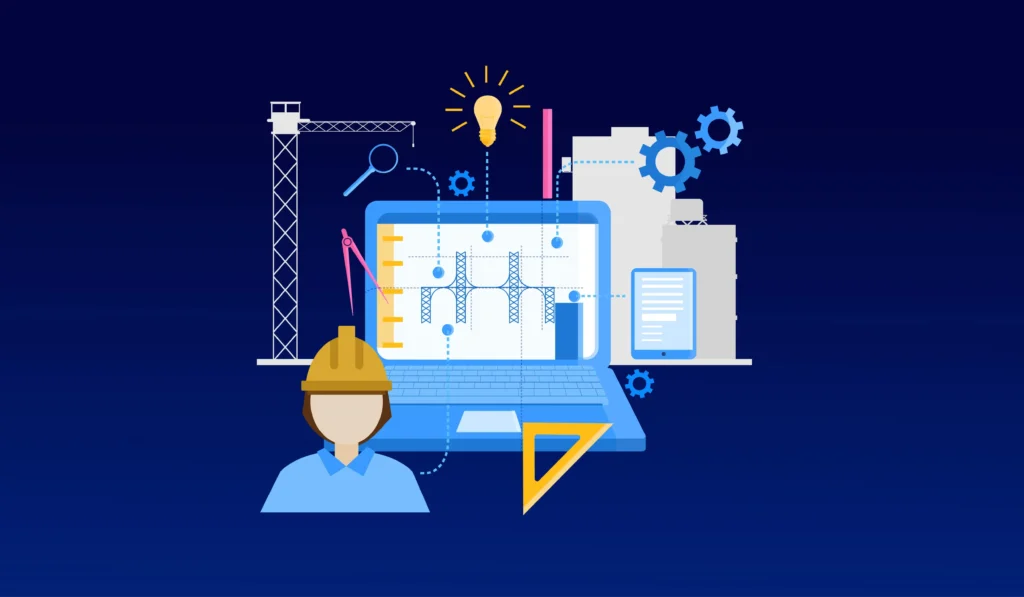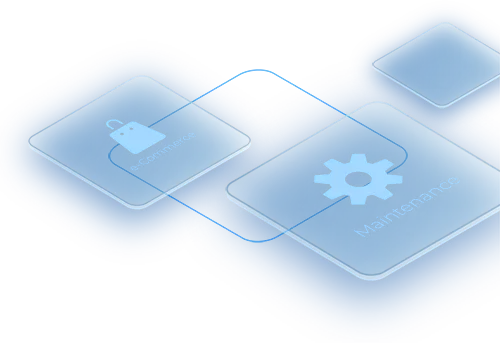
Why You Need ERP in Construction?

Why You Need ERP in Construction?
The construction industry is a dynamic sector that requires careful management of resources, workforce, and timelines.
With increasing complexities and demands, businesses are searching for efficient ways to manage their operations.
This is where the need for ERP in construction has become the most essential aspect to do everything in the right way.
ERP systems have revolutionized how companies approach project management, resource allocation, and financial tracking in the construction domain.
Through this blog, we will explore the role of ERP in construction, its benefits, and the challenges faced during its implementation phase.
We also aim to highlight why ERP construction services are critical for modern construction businesses.
Content Index
- Define ERP
- Processes Managed Using ERP
- How ERP Used in Construction
- Benefits of ERP Systems in the Construction Field
- Key Features of ERP Systems for Construction
- ERP Implementation and Challenges
- Conclusion

Define ERP
ERP, or Enterprise Resource Planning, refers to a software system that integrates multiple business processes into a centralized platform.
It enables organizations to manage core activities such as financial management, human resources, supply chain, and project management efficiently.
With all key operations connected, teams can collaborate more easily, making workflows smoother and more transparent.
The need for ERP in construction arises from the necessity to handle multifaceted operations without compromising quality or project timelines.
ERP construction solutions offer comprehensive tools designed to meet the unique challenges of the construction sector.
By centralizing data and processes, ERP helps reduce miscommunication and delays, fostering a more productive environment.
Construction businesses can respond to changes quickly while making sure that the projects stay on track.
Implementing ERP systems provides construction companies the power to improve both daily operations and long-term strategic goals.
Processes Managed Using ERP
In the construction industry, managing various processes efficiently is significant for project success.
ERP systems play a key role in handling these processes by integrating all main or core functions into one platform.
From project management to financial tracking, ERP solutions offer construction businesses the tools they need to do day-to-day operations easily.
Project Management
ERP systems help construction businesses track project timelines, monitor progress, and assign resources effectively.
With the right ERP solutions, teams can communicate more effectively, making it easier to make data-driven decisions.
The need for ERP in construction becomes evident as companies need real-time updates on project developments and potential roadblocks.
By using ERP for project management, businesses can achieve better organization and reduce delays.
Financial Management
Financial tracking is essential in the construction sector, and ERP services provide tools for managing budgets, invoicing, and payroll accurately.
ERP systems allow businesses to monitor and control project costs, preventing overspending and project delays.
With comprehensive financial management capabilities, construction companies can maintain better financial health while managing large, complex projects.
ERP solutions handle all financial aspects, making it easier for businesses to stay within budget.
Human Resource Management
ERP services in human resource management help construction companies track employee performance, payroll, and labor hours, ensuring smoother project operations.
With an ERP solution, construction businesses can manage workforce scheduling, monitor overtime, and stay compliant with labor laws.
As construction projects often require a flexible workforce, ERP systems assist in managing both temporary and permanent labor needs.
The solutions also help with recruitment and retention strategies by providing insights into labor trends and resource allocation.
Supply Chain Management
Managing the flow of materials, equipment, and supplies is critical in the construction sector.
ERP solutions help businesses keep track of inventory levels, manage procurement processes, and monitor supplier relationships.
With ERP systems in place, construction companies can avoid costly delays related to supply shortages, ensuring that materials and resources are available when needed.
ERP services simplify supply chain management by automating key processes, improving efficiency, and reducing risks of project disruption.
How ERP Used in Construction
The construction industry faces unique challenges, including fluctuating demands, intricate schedules, and diverse workforce coordination.
ERP construction services offer specialized modules designed to meet these needs:
Bid and Tender Management
ERP services play an essential role in managing bids and tenders by automating the entire process from initial proposal creation to final submission.
Construction companies can track tender deadlines, store bid documentation, and compare offers from different vendors.
With ERP systems, businesses can quickly assess the competitiveness of their proposals and ensure all necessary information is included.
The need for ERP in construction arises from the complexity of managing multiple tenders simultaneously.
This will require effective organization and communication between departments.
Scheduling and Planning
Scheduling and planning are vital for meeting deadlines in construction projects, and ERP solutions help manage these tasks effectively.
ERP systems allow businesses to create detailed project schedules, track progress in real time, and adjust plans as necessary.
By incorporating project timelines, resource availability, and potential delays, ERP helps companies plan each phase with greater precision.
This improves overall project flow and reduces the risk of costly disruptions.
Cost Estimation and Budgeting
Accurate cost estimation and budgeting are critical for successful project execution.
ERP solutions enable construction companies to create precise cost estimates and develop realistic budgets.
The system automatically tracks expenses, including labor, materials, and equipment costs, allowing businesses to stay within budget.
ERP services also help monitor cash flow, ensuring that companies do not face financial difficulties throughout the project lifecycle.
This capability addresses the importance of ERP in construction, where large and complex budgets need to be managed and monitored continuously.
Document Control
Managing documentation in construction is difficult, but ERP systems simplify this task by centralizing all project-related documents in one platform.
From contracts and permits to design blueprints and progress reports, ERP ensures that construction teams can access the necessary documents easily and securely.
Document control through ERP helps prevent data loss, reduces errors, and enhances collaboration between teams.
This is particularly important in large-scale projects, where multiple stakeholders need access to up-to-date information at all times.
Risk Management
Risk management is a crucial aspect of any construction project, and ERP solutions provide tools to identify, assess, and mitigate risks.
ERP systems help construction businesses monitor project milestones, analyze potential risks, and track safety issues.
By maintaining a centralized record of risks, businesses can take proactive steps to prevent delays or accidents.
ERP services assist project managers in evaluating risks and making data-driven decisions to minimize potential impacts, ensuring smoother project execution.
Benefits of ERP Systems in the Construction Field
Adopting an ERP system offers numerous advantages to construction firms, such as:
Centralized Data Management
With an ERP system, all crucial project data, including budgets, schedules, and resources, are stored in a single, centralized platform.
This eliminates the need for multiple systems and ensures that data is easily accessible to all team members.
The need for ERP in construction arises from the complexity of managing a wide range of project information across various teams and locations.
By centralizing data, ERP solutions provide a comprehensive view of all ongoing operations and project statuses.
Accurate Financial Tracking
ERP systems help construction companies accurately track costs, budgets, and invoices, providing real-time visibility into financial health.
These systems manage everything from payroll to project expenses, preventing discrepancies and ensuring that all financial records are precise.
With an ERP solution, construction businesses can make more informed decisions about cost allocations, helping prevent budget overruns.
Accurate financial tracking is essential for construction companies to remain profitable and compete in a challenging market.
Improved Decision-Making
By providing real-time, data-driven insights, ERP systems enable construction managers to make informed decisions based on current project data.
These insights include detailed reports on project progress, resource allocation, and financial performance, offering clarity on potential risks.
The ability to analyze data quickly and comprehensively is essential in construction, where timely decisions can impact project success.
ERP solutions play a crucial role in improving decision-making by presenting key metrics and information in an easily digestible format.
Scalability
As construction companies grow, their processes and data needs become more complex.
ERP systems offer scalability, allowing businesses to add modules or expand functionality as needed.
This adaptability means that the ERP system can expand with the firm, supporting new projects, teams, or locations.
Construction firms can rely on ERP services to scale their operations without having to replace or overhaul existing systems.
Scalable ERP solutions provide long-term value by adapting to the evolving needs of a growing business.
Future-Proofing
ERP solutions for construction are designed to adapt to technological advancements and changes in the industry.
By integrating with other emerging technologies, such as AI and machine learning, ERP systems can help businesses stay competitive in an increasingly digital world.
Future-proofing construction operations through ERP means that businesses are ready to meet the demands of evolving project management trends.
These systems offer long-term sustainability, allowing construction companies to maintain efficient workflows and stay ahead of industry shifts.
The integration of ERP construction solutions can help companies with the tools needed to address the complexities of today’s construction business.
Key Features of ERP Systems for Construction
When selecting an ERP system for construction, businesses should look for the following features:
Real-Time Reporting
Real-time reporting capabilities allow construction companies to track project progress, costs, and timelines as they happen.
With accurate, up-to-date information, businesses can make quicker, more informed decisions, which is vital for avoiding delays.
The need for ERP in construction is evident in the importance of having constant visibility into ongoing projects, financials, and resources.
Real-time reporting provides managers right tools needed to keep everything on track and address issues immediately.
Mobile Accessibility
Mobile accessibility ensures that team members on-site can access essential project data directly from their smartphones or tablets.
This feature allows construction managers, contractors, and field workers to update and retrieve information anytime, anywhere.
ERP solutions with mobile capabilities bridge the gap between office-based and on-site teams, promoting better communication and workflow.
Construction businesses that require flexibility and fast decision-making greatly benefit from mobile access to their ERP system.
Customizable Dashboards
Customizable dashboards allow construction companies to tailor the ERP interface to suit their specific needs and workflows.
This feature enables businesses to highlight key performance indicators (KPIs), financial data, and project statuses in a way that is most relevant to their teams.
Custom dashboards give project managers the ability to track what matters most at a glance, eliminating the need to sift through unnecessary data.
ERP services with customizable dashboards offer enhanced control and personalization to meet specific construction business needs.
Integration Capabilities
ERP systems with strong integration capabilities can connect easily with other software used within the construction industry.
This ensures that all systems work together efficiently, eliminating the need for manual data entry and reducing the risk of errors.
Integration is critical for businesses seeking a comprehensive solution that can scale and accommodate future software upgrades.
The right ERP solutions for construction like EBR’s ERP System for Construction integrate multiple platforms, improving operational flow and data consistency.
Risk Management Tools
Effective risk management tools are essential for managing uncertainties in construction projects, such as budget overruns, safety concerns, and regulatory compliance issues.
ERP systems equipped with risk management features help businesses identify potential risks early and mitigate them before they become serious problems.
These tools enable construction companies to monitor risks across various aspects of their projects and take proactive measures to safeguard their investments.
The need for ERP in construction grows as projects become more complex and risk management becomes increasingly important.
ERP Implementation and Challenges
While the benefits of ERP systems are substantial, implementing them comes with numerous challenges:
Cost of Implementation
The cost of implementing an ERP system can be significant, especially for construction businesses with limited budgets or resources.
Expenses include purchasing the software, hardware upgrades, and ongoing maintenance fees, which can quickly add up.
Construction firms must carefully evaluate their financial capabilities before committing to an ERP solution to avoid unforeseen costs.
The use of ERP Systems in the construction field highlights its value, but companies must plan thoroughly to achieve a return on investment.
Change Management
Introducing an ERP system requires significant adjustments in existing processes and workflows, which can meet resistance from employees.
Construction businesses often face challenges in convincing teams to adopt new methods and abandon traditional systems.
Effective change management practices, such as open communication and stakeholder involvement, are important for overcoming opposition.
ERP solutions can transform operations, but their success depends on how well businesses manage the transition phase.
Training Requirements
ERP systems often involve complex interfaces and new processes that require employees to undergo thorough training.
Training sessions take time and resources, which can impact productivity during the initial stages of implementation.
Construction businesses must invest in effective training programs to help their teams understand the ERP system’s features and functionality.
Without proper training, employees may struggle to adapt, limiting the effectiveness of ERP services.
Customization Needs
Every construction business has unique processes and requirements, which may not align perfectly with standard ERP features.
It might be expensive and time-consuming to customize the system to meet certain requirements.
Businesses must work closely with ERP providers to identify areas requiring adjustments and develop solutions tailored to their operations.
Customization is necessary to fully utilize the benefits of ERP in construction, but it often adds complexity to the implementation process.
Data Migration Challenges
Transferring existing data into the ERP system is a critical step that can pose challenges if the data is disorganized or incomplete.
Construction companies often maintain records across various systems, making the consolidation process difficult.
Proper data migration requires meticulous planning, testing, and validation to avoid errors that could impact operations.
ERP services help standardize data, but businesses must prepare adequately to address migration complexities.
Conclusion
In this competitive environment, the need for ERP in the construction industry is more important than ever.
ERP systems bring together essential processes, help teams make better decisions, and allow businesses to manage resources effectively.
They are no longer a luxury but a necessity for companies aiming to stay at the forefront of an overly demanding industry.
By choosing the right ERP solutions, construction firms can build a solid foundation for growth and adapt to the challenges of an ever-evolving market.
Explore these topics to gain a thorough understanding of ERP systems.
- Why You Need ERP In Retail?
- Why You Need ERP In Professional Services?
- ERP Systems: Understanding Implementation Cost Factors
- ERP System in Healthcare: Benefits & Components
Let's Connect!
Are you currently exploring software solutions for your business? 🤔
Great! What’s the single biggest challenge you’d like a software solution to solve for your business? 🎯
💡 Suggested Solution Ideas:
Just one more step! Share your details so our experts can connect with you personally and discuss tailored solutions. 🤝
Thank You for Connecting! 🎉
We've received your information and a specialist will be in touch with you very shortly to discuss how we can help your business thrive.
In the meantime, feel free to browse our resources or reach out if you have immediate questions.
Understood! 🙏
No worries if you're not exploring software solutions right now. Our door is always open if your needs change!
Feel free to explore our other offerings or connect with us anytime.
Featured






